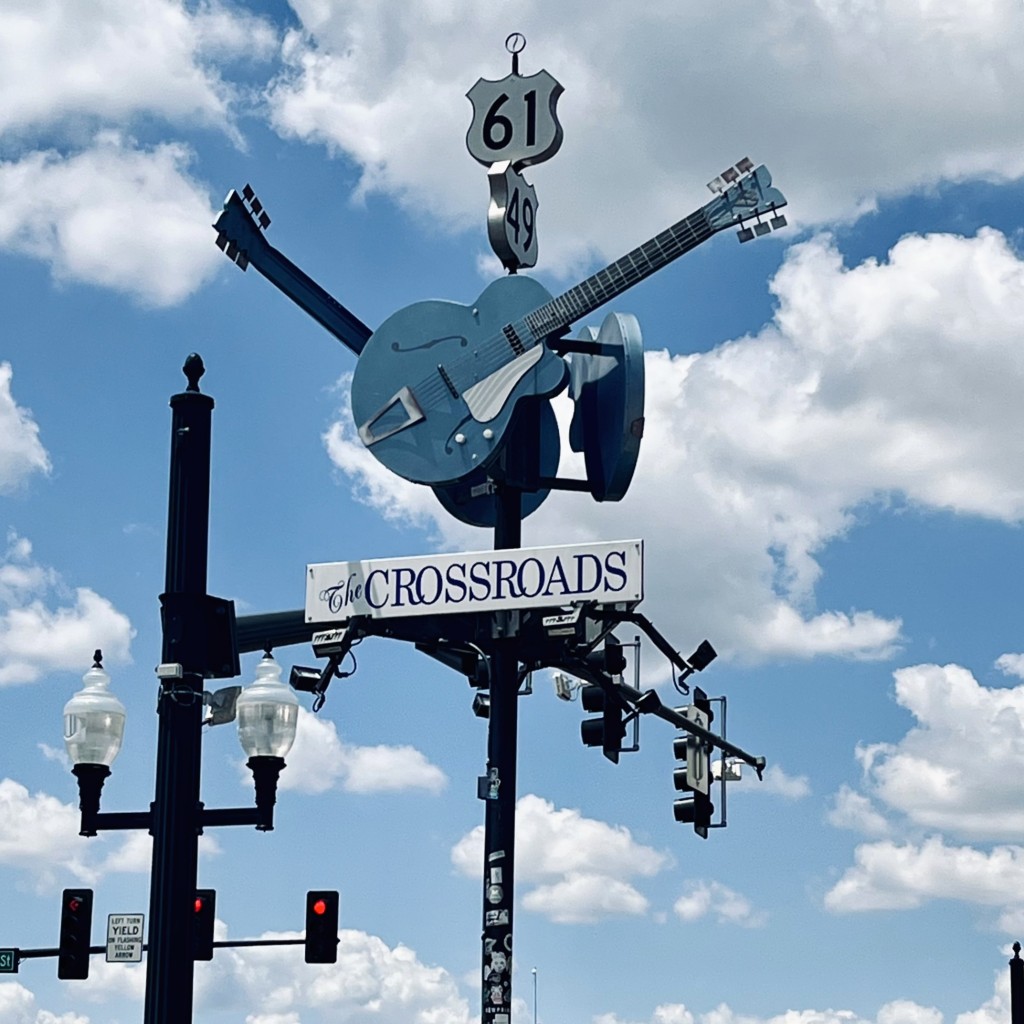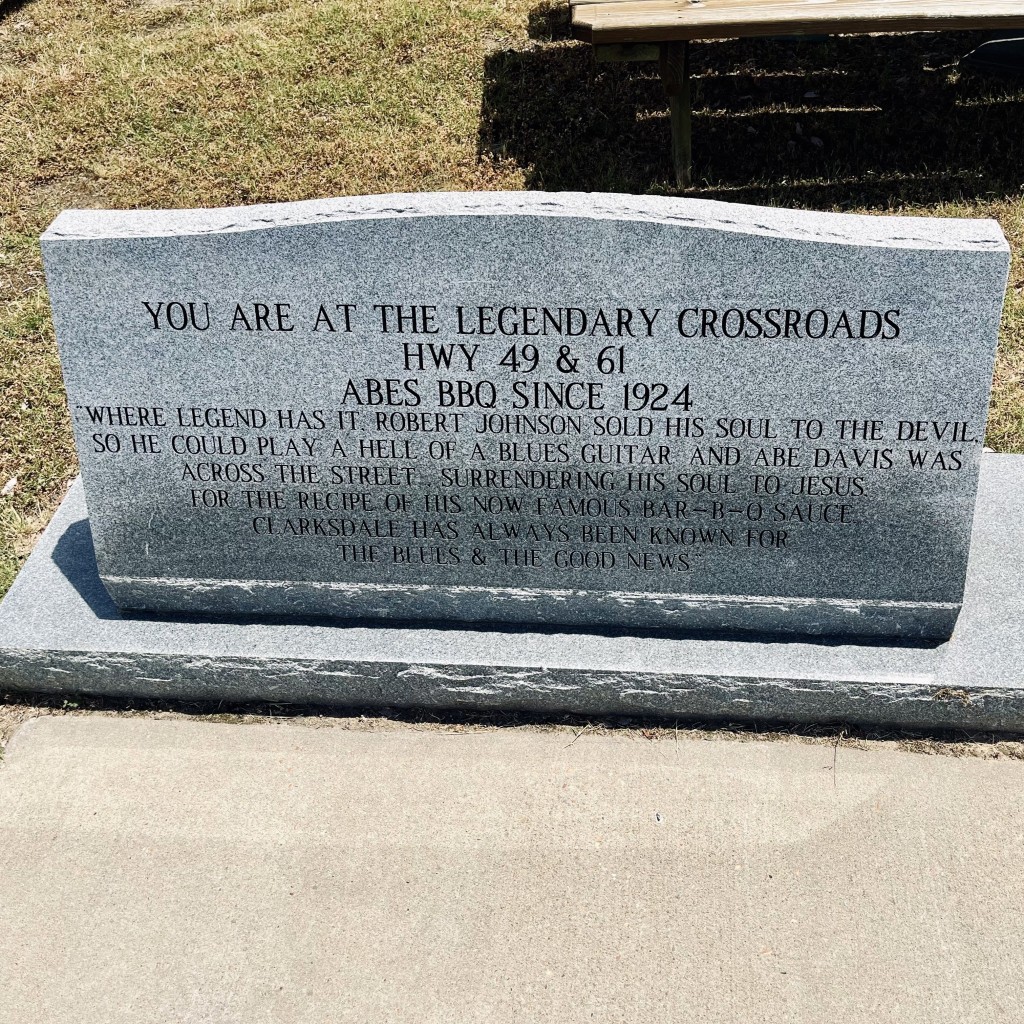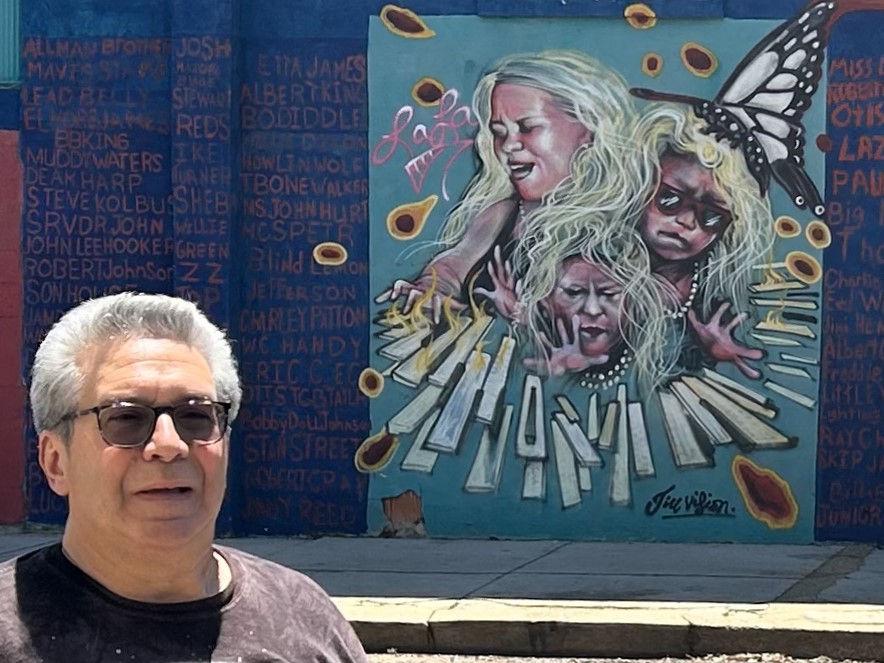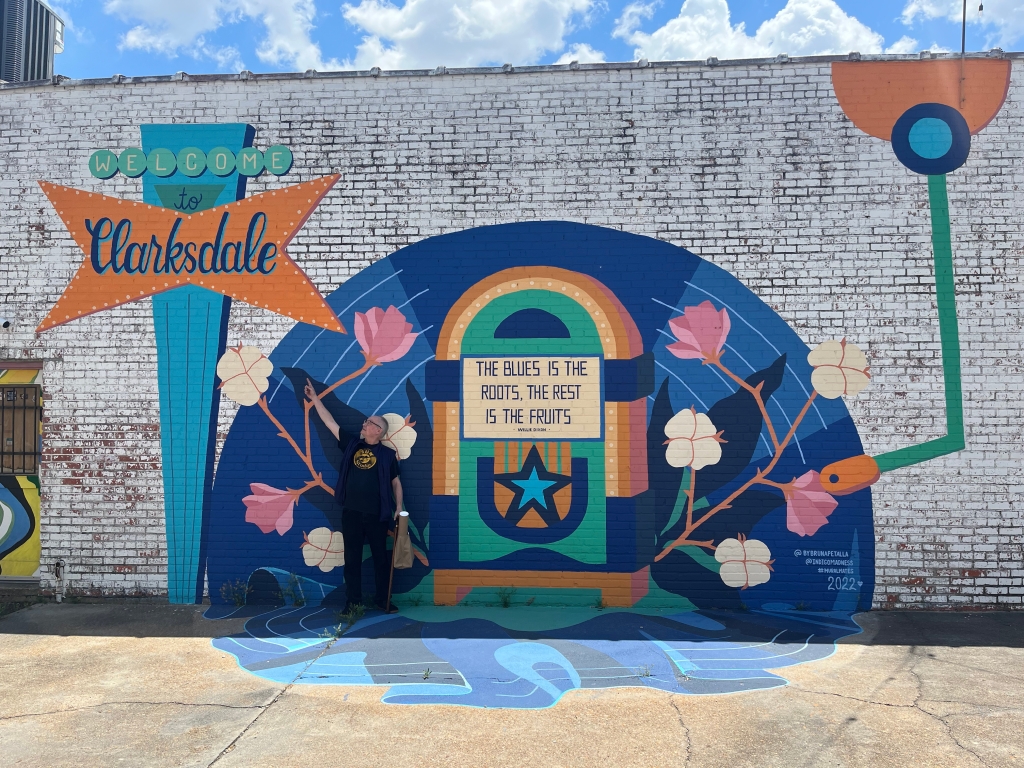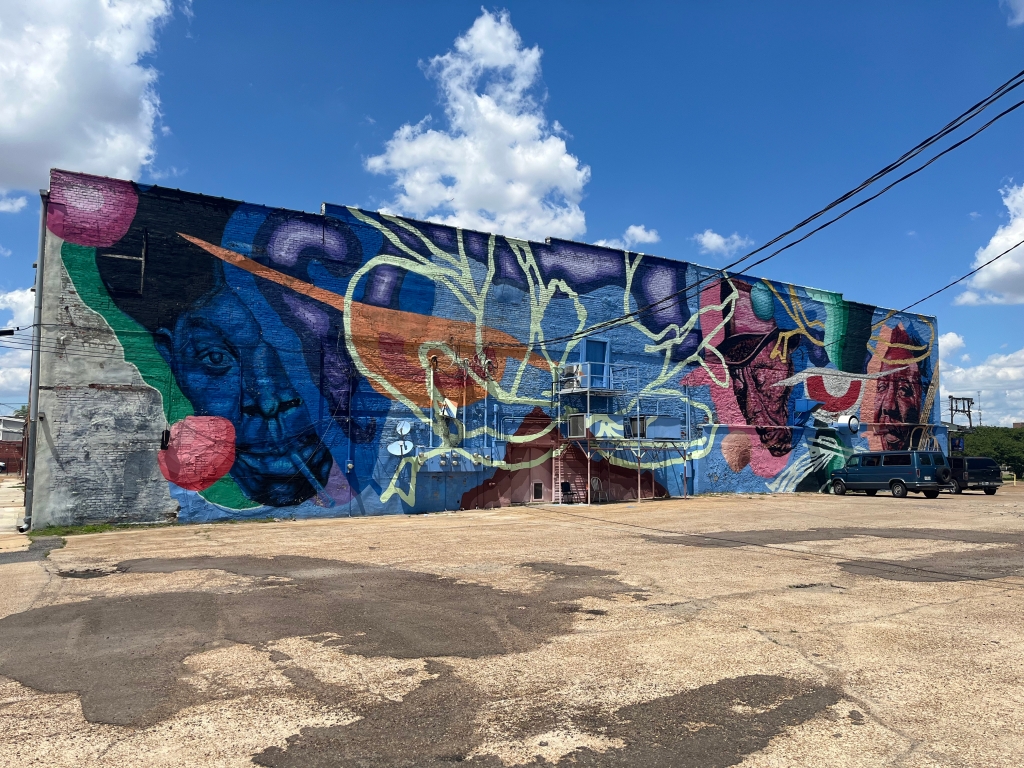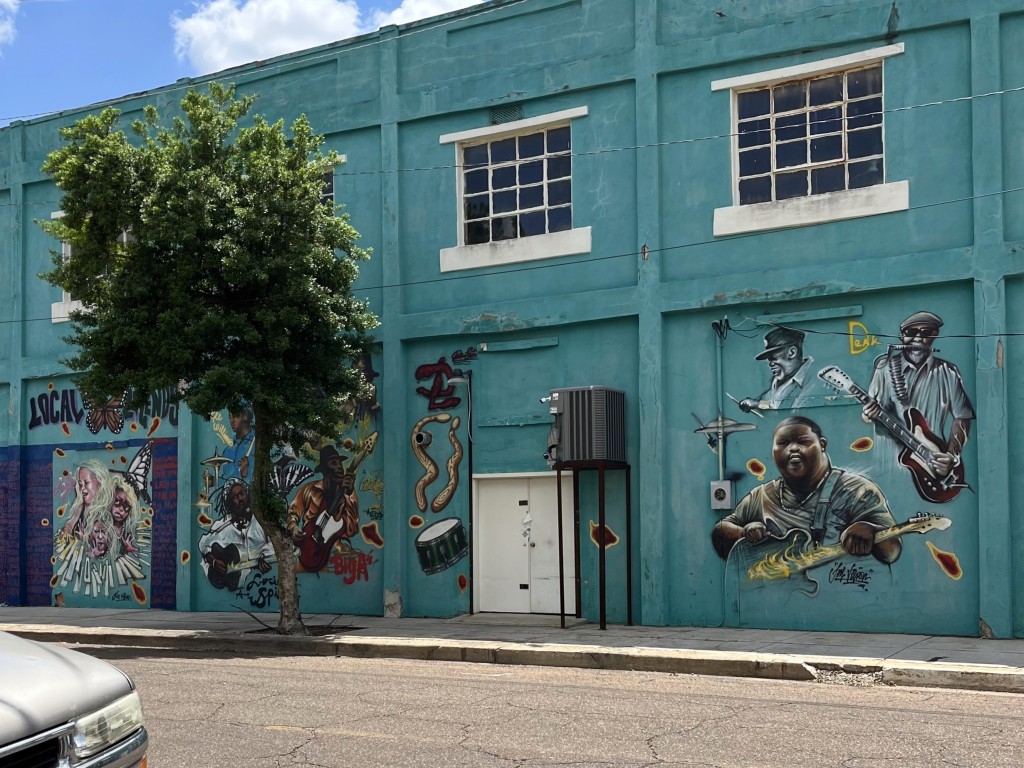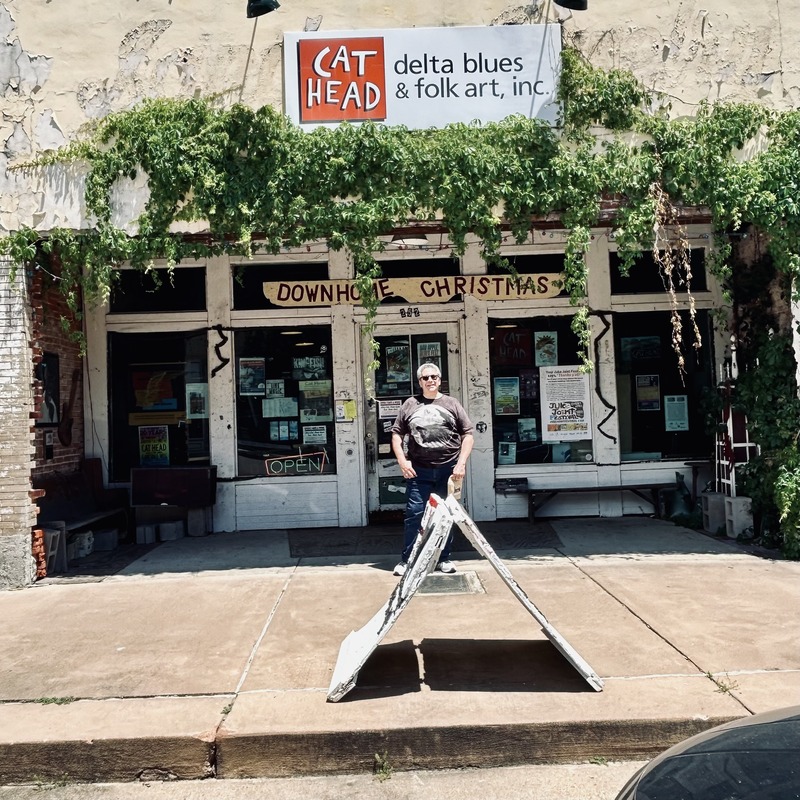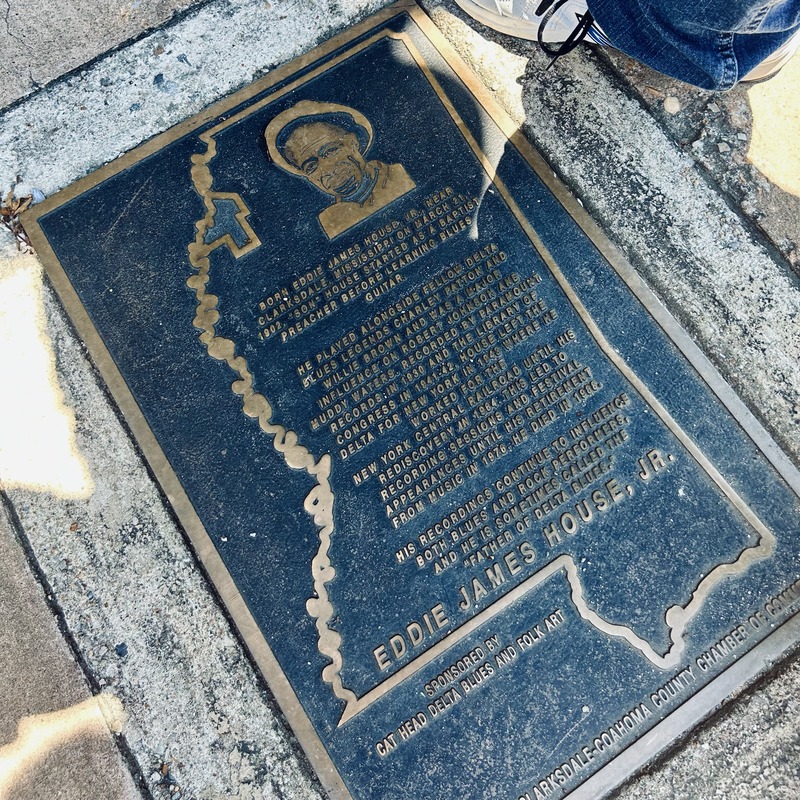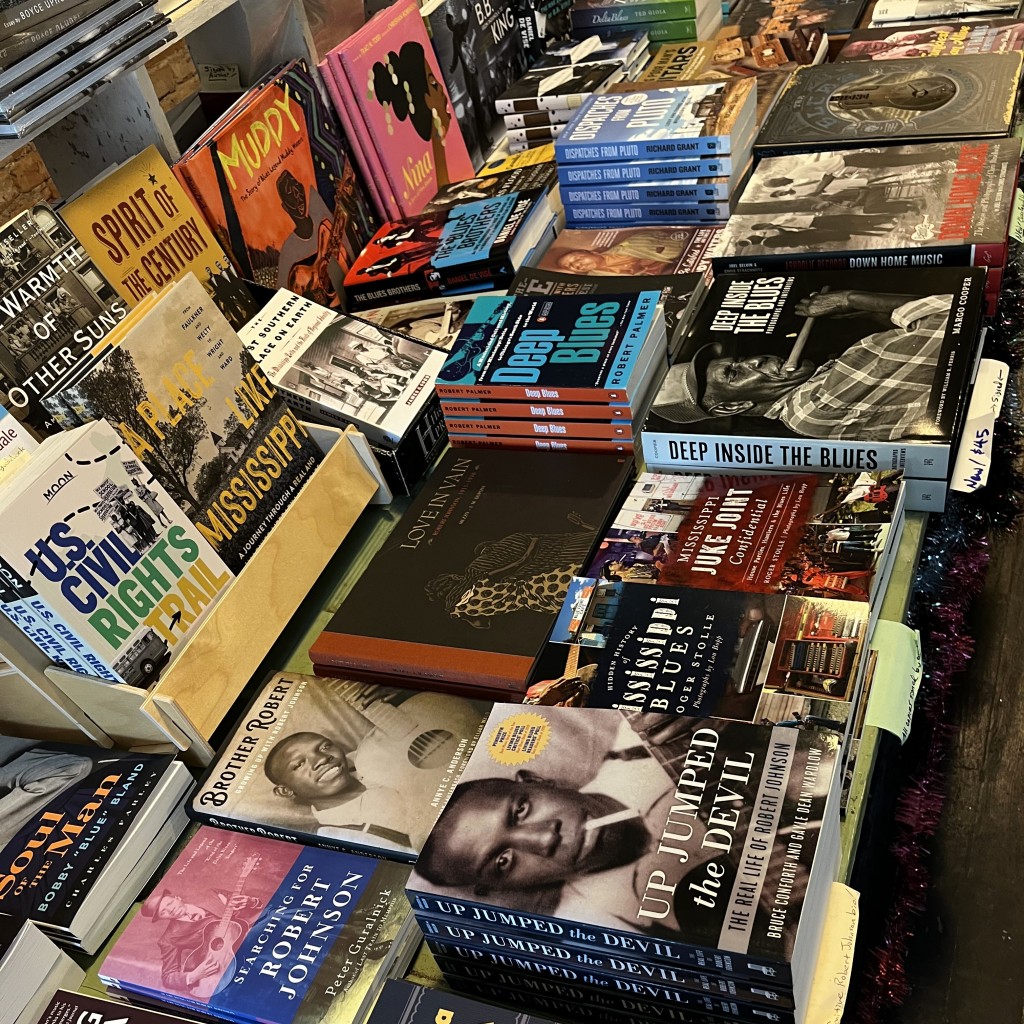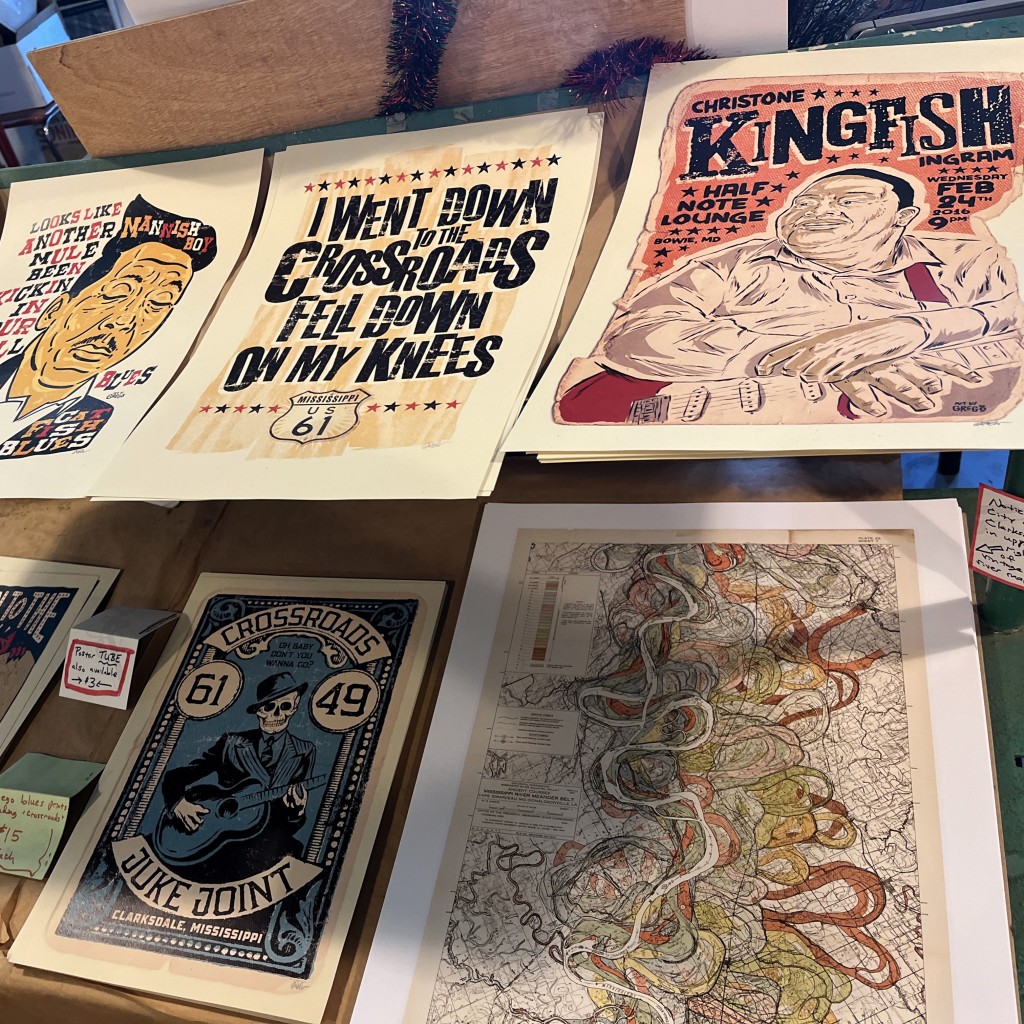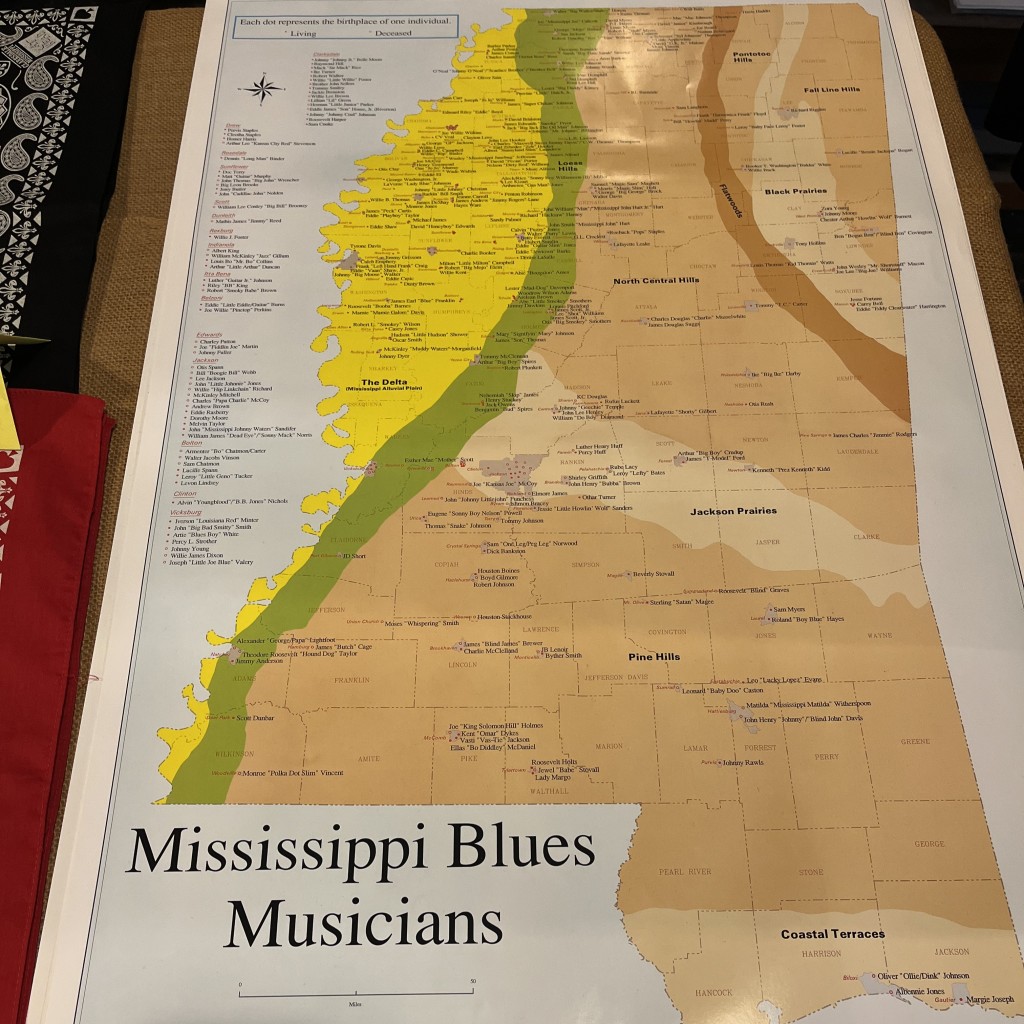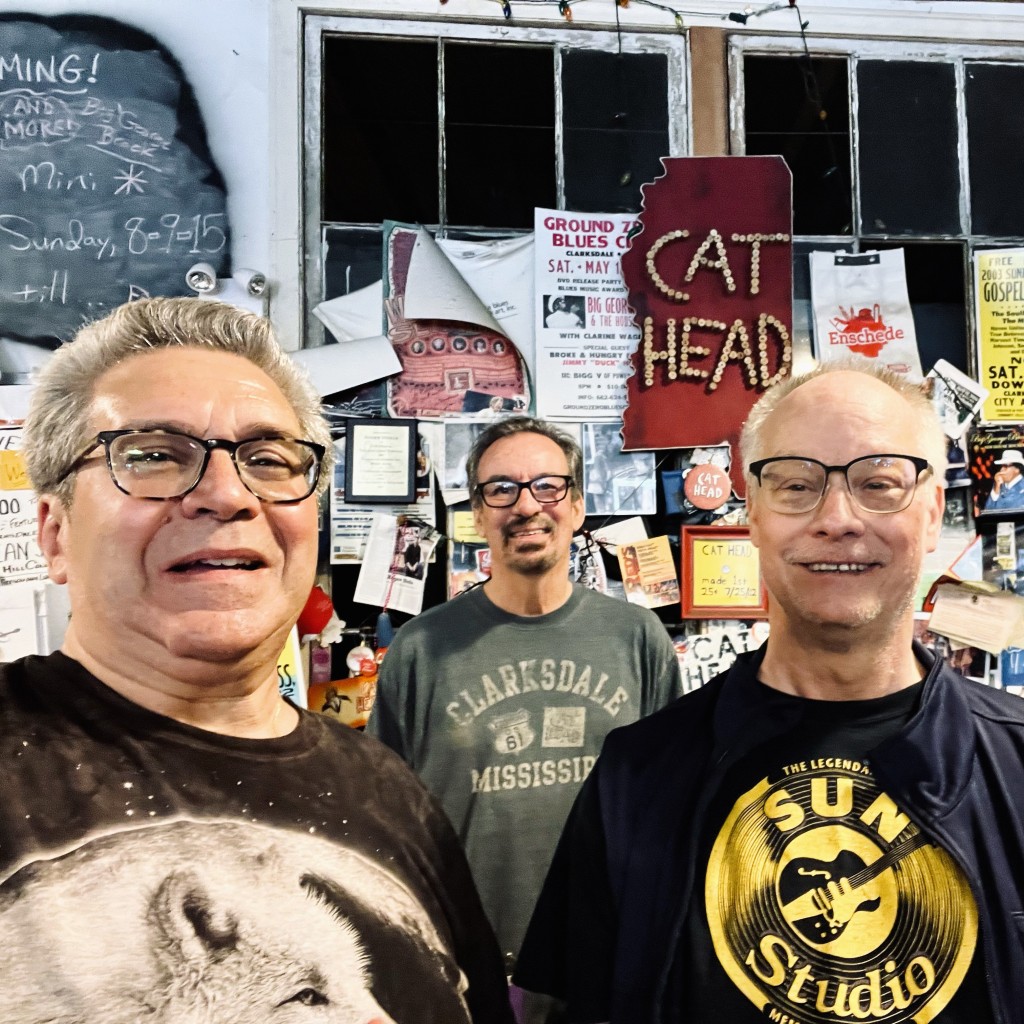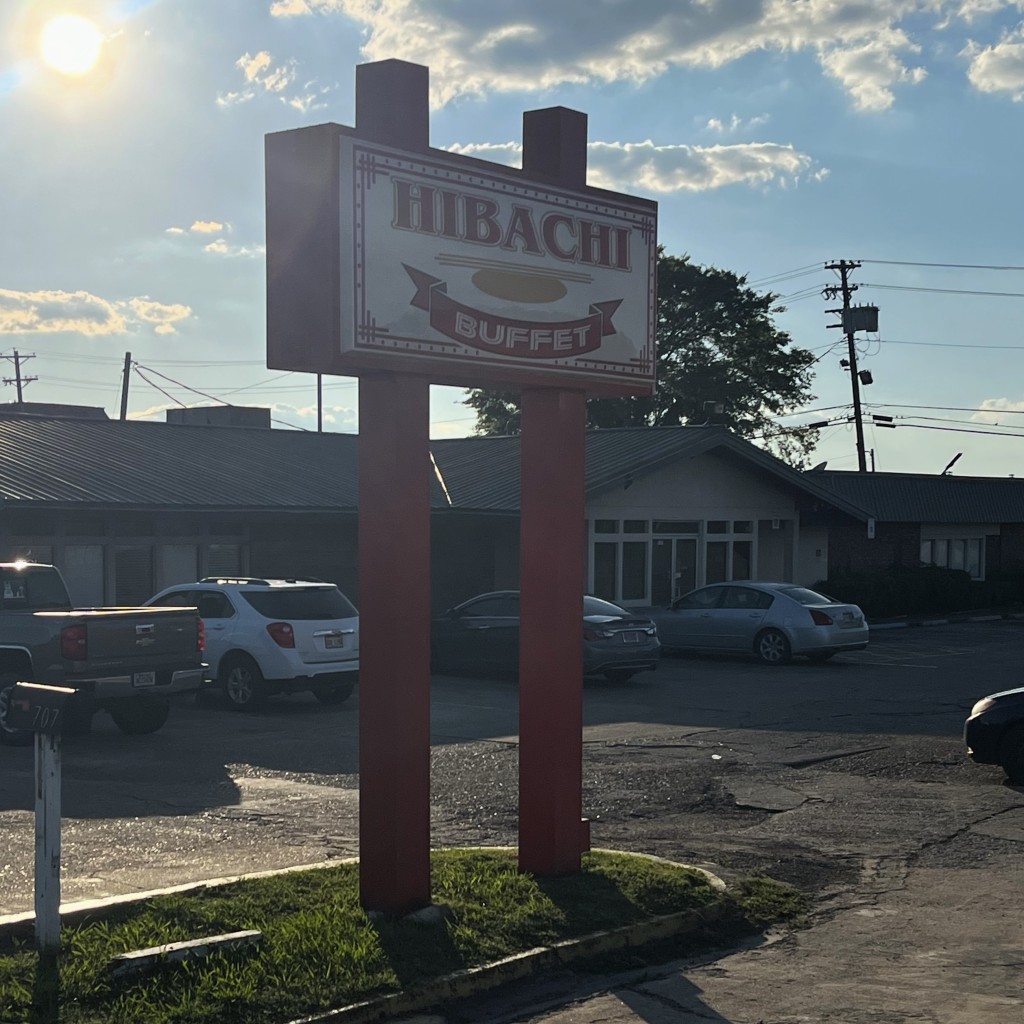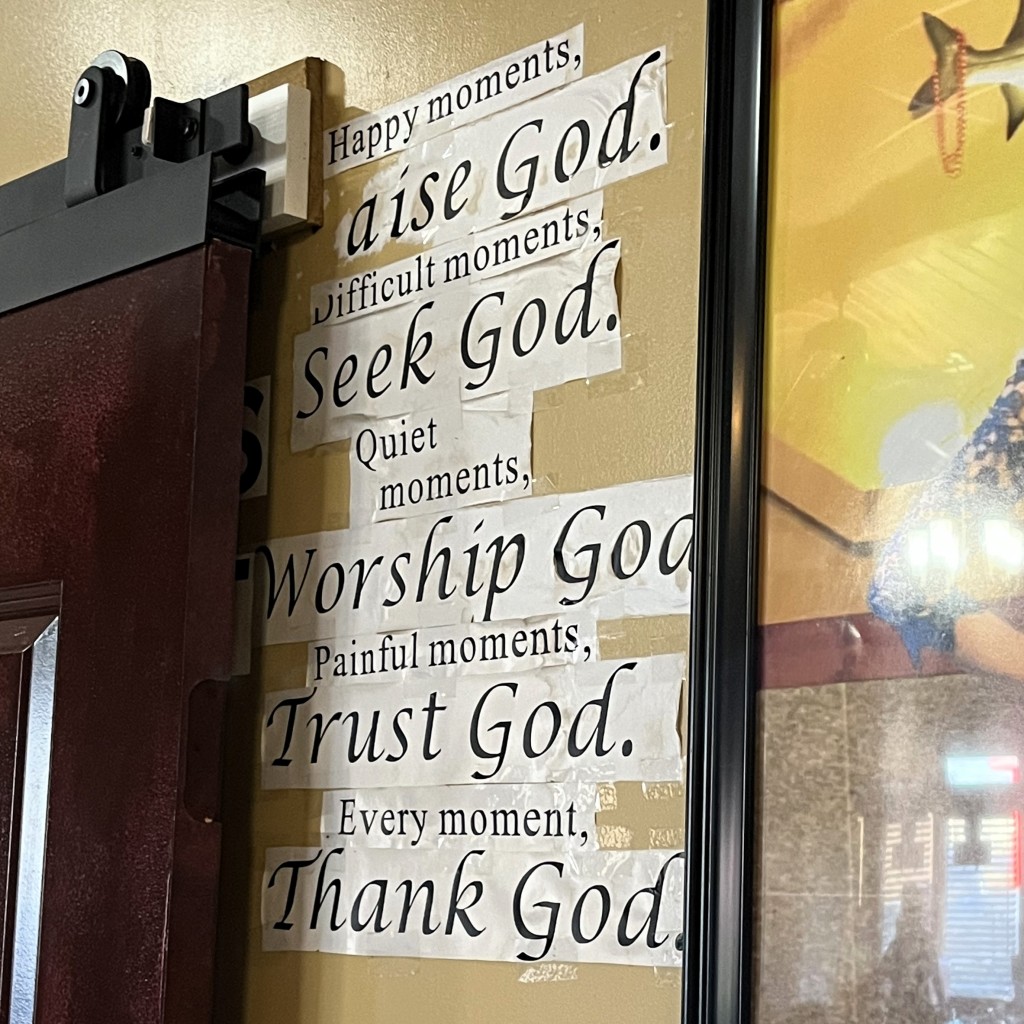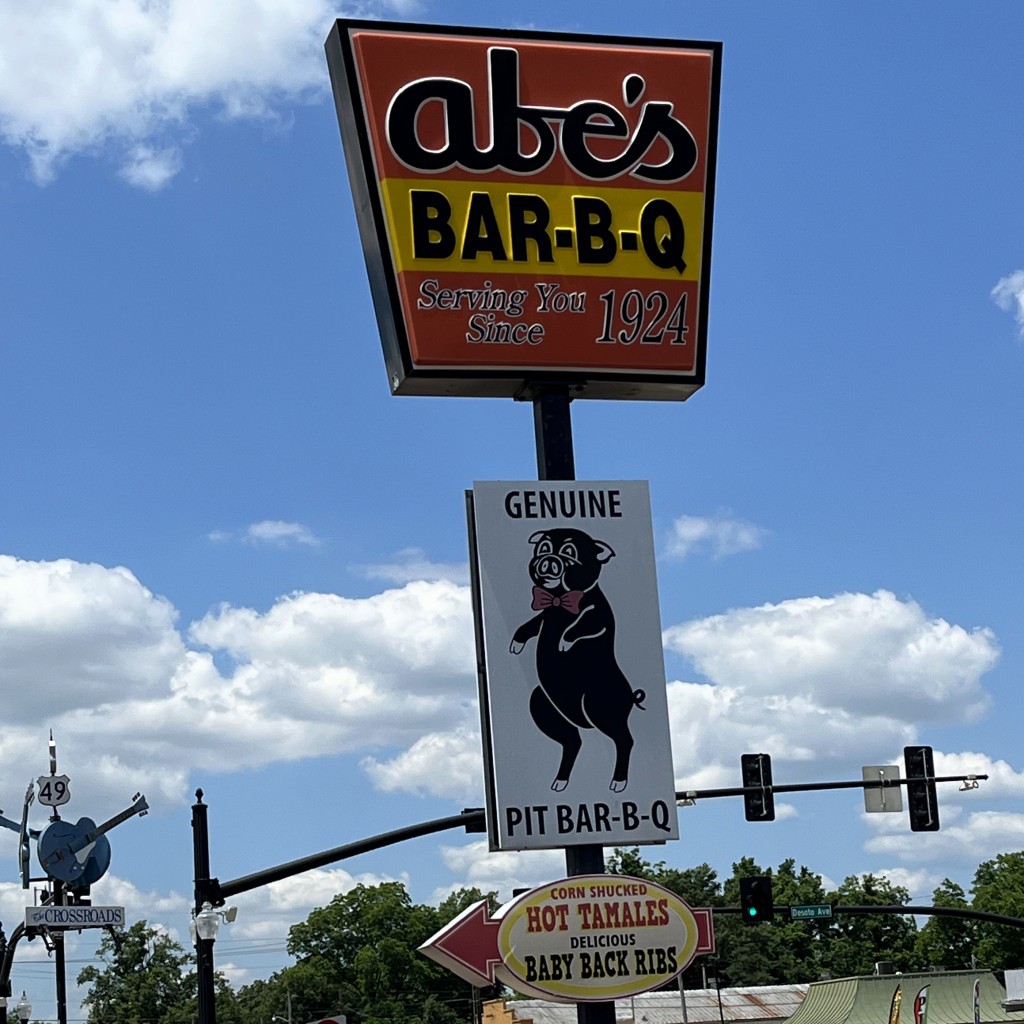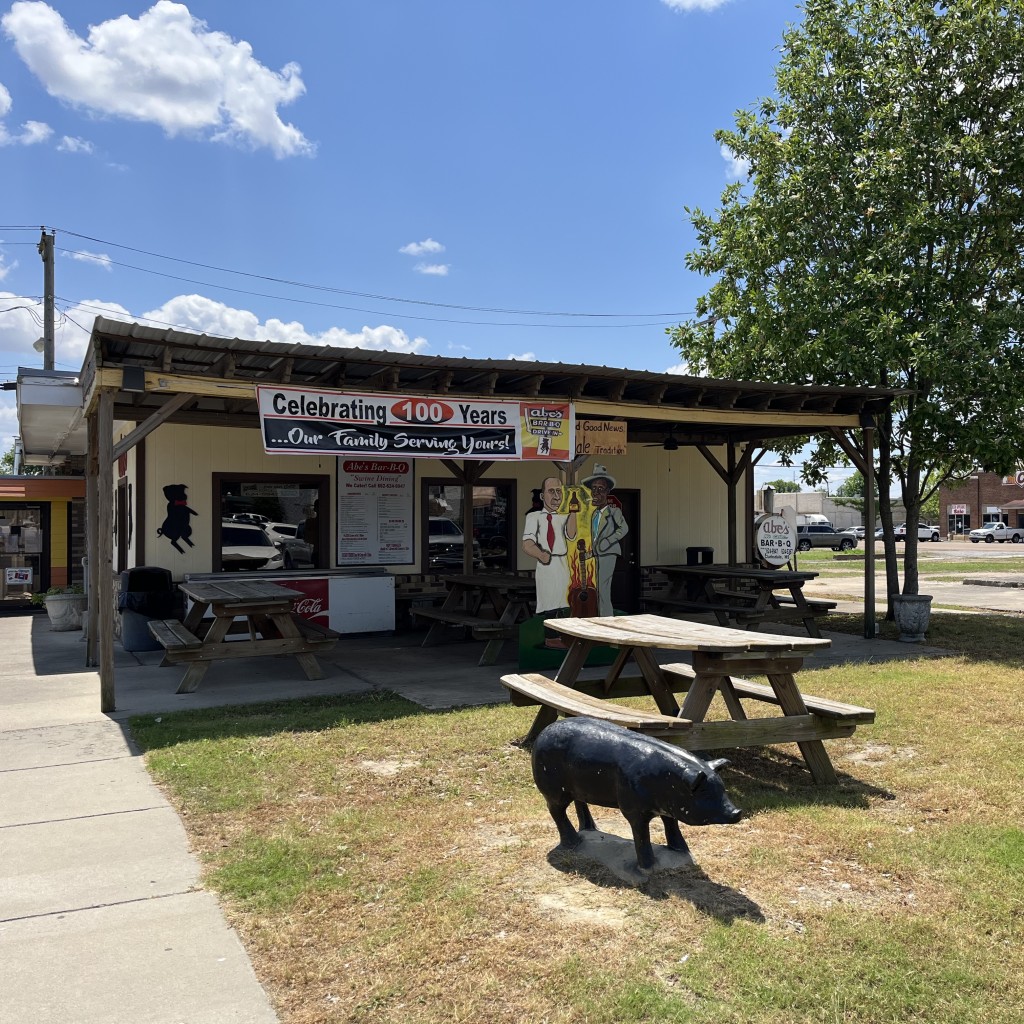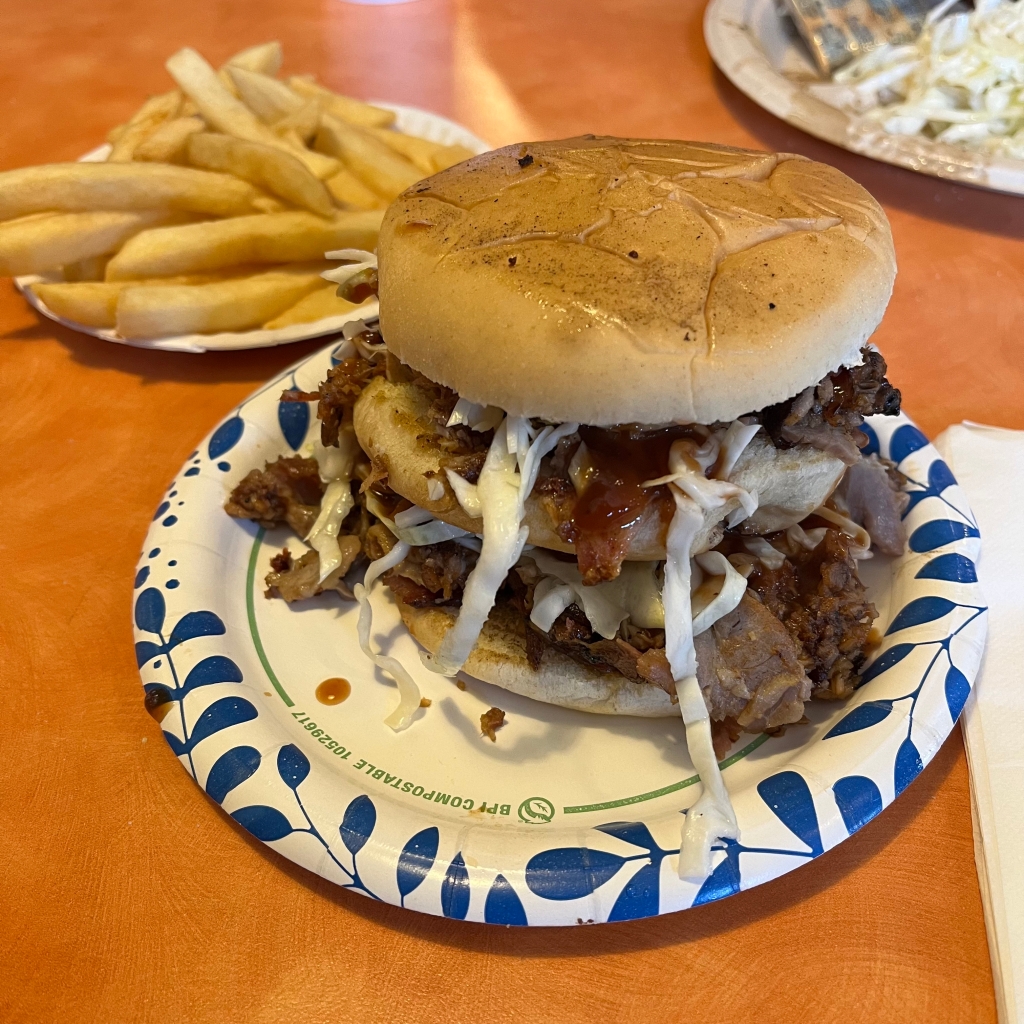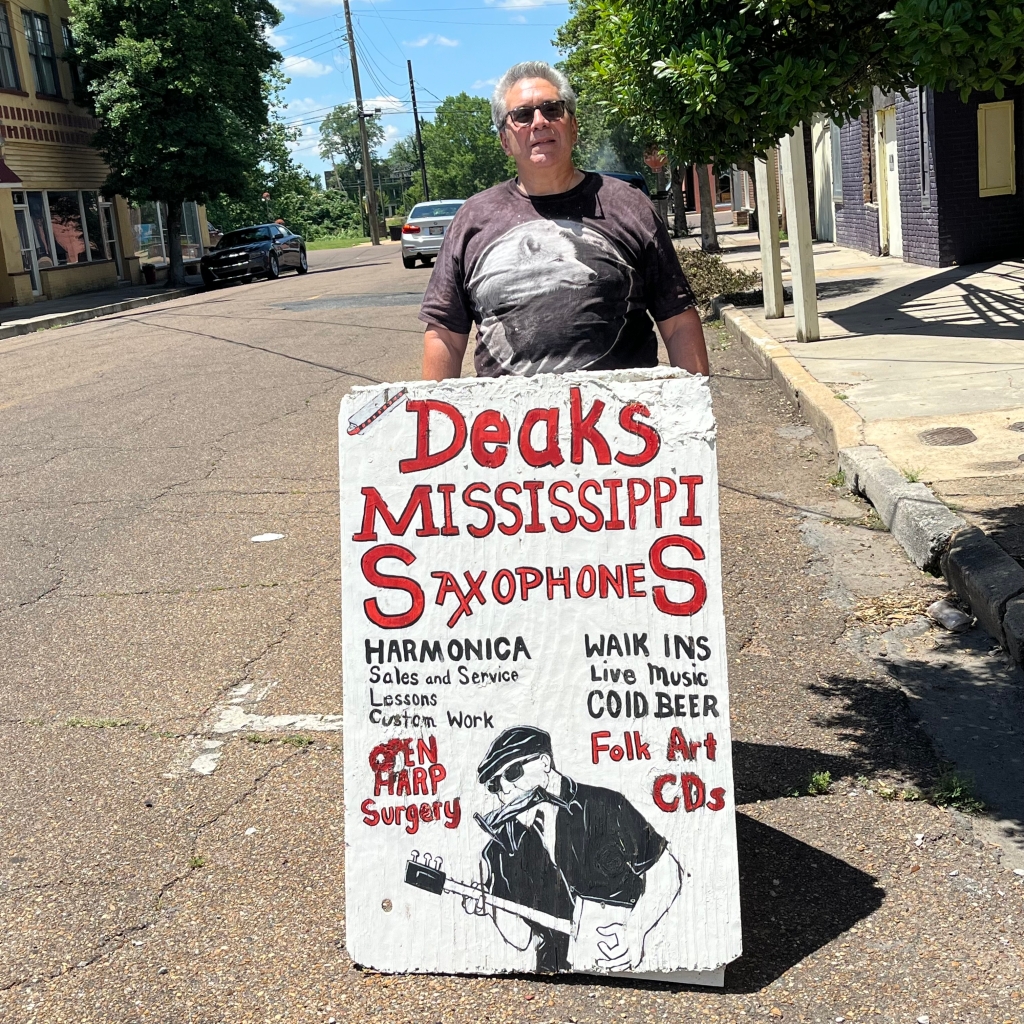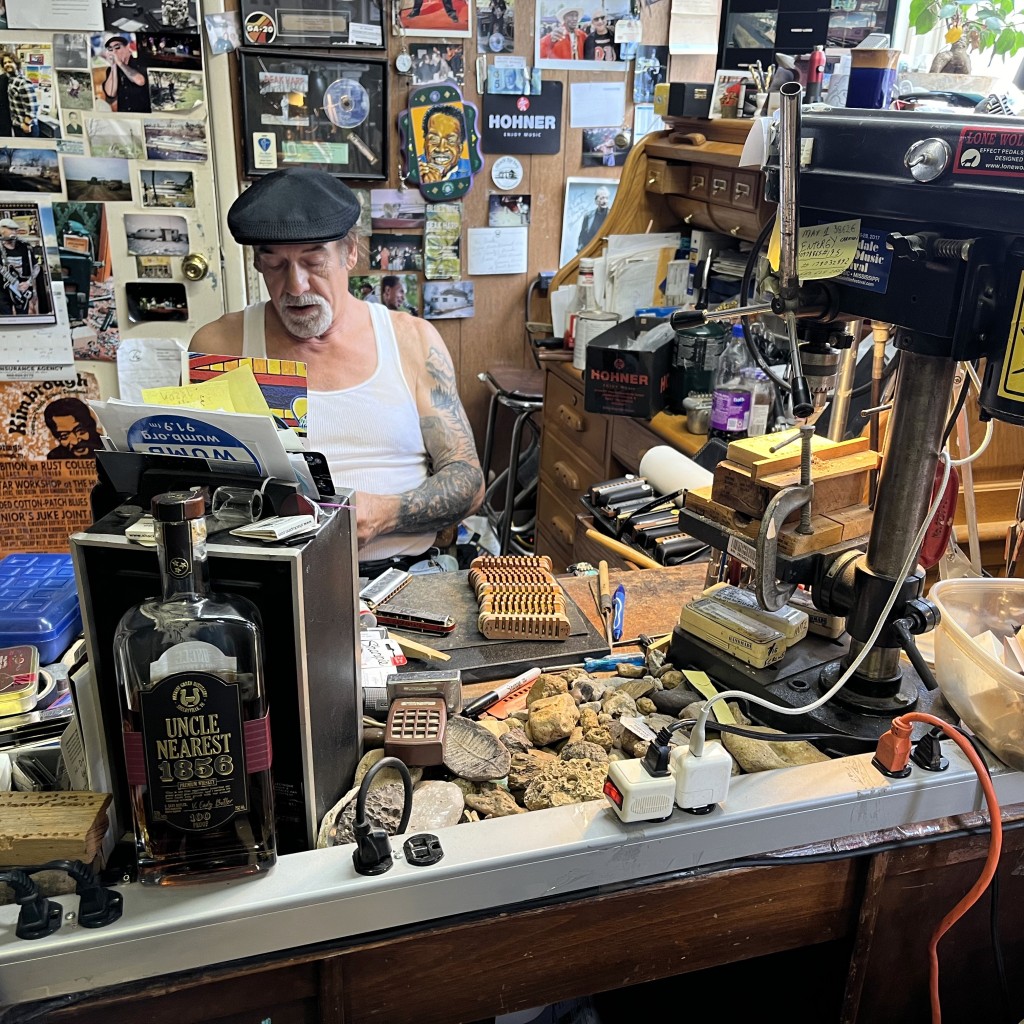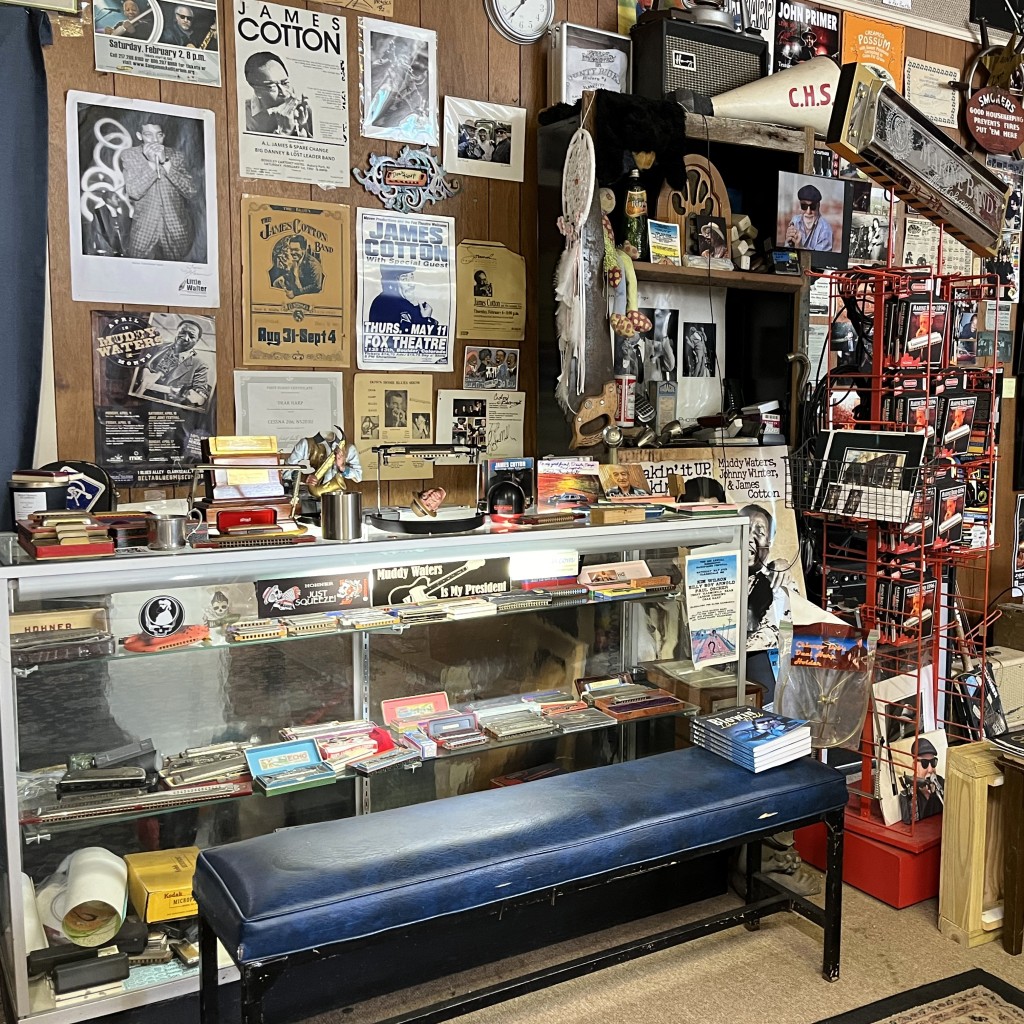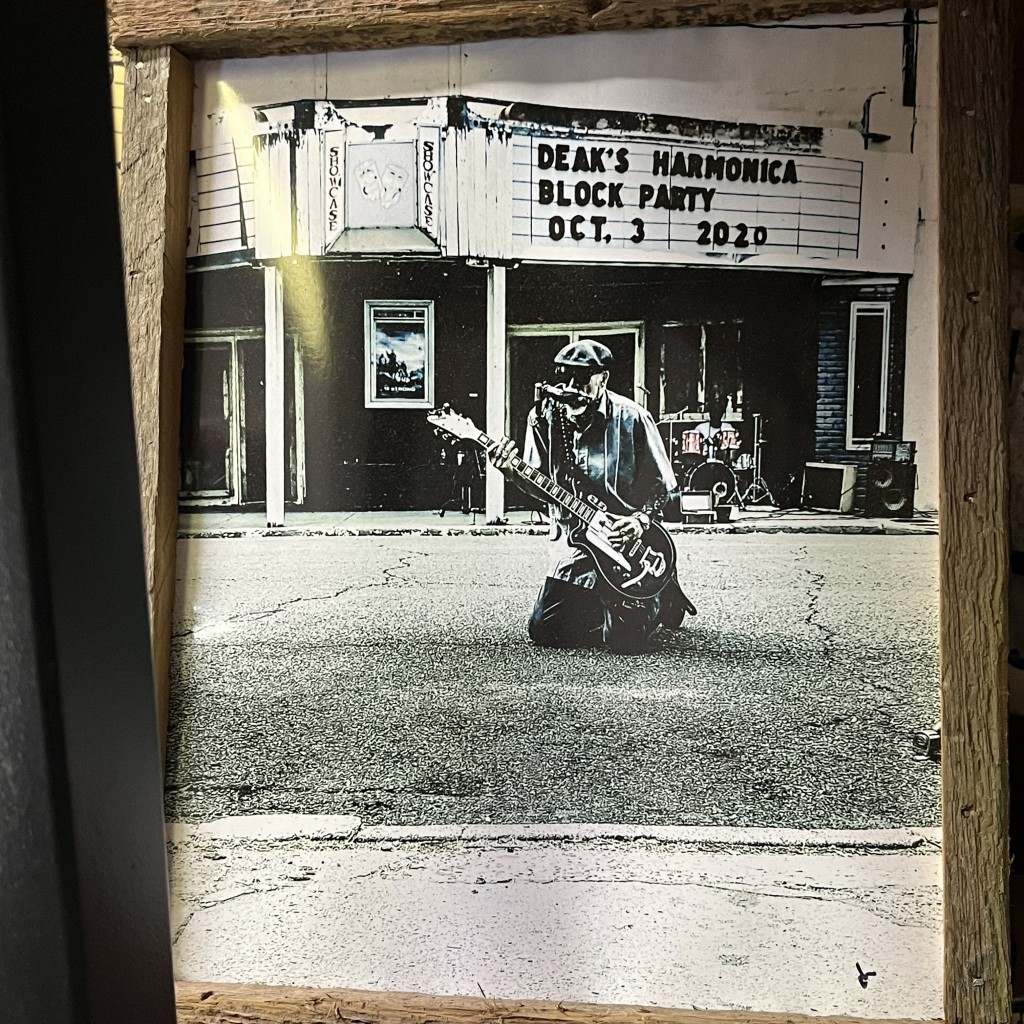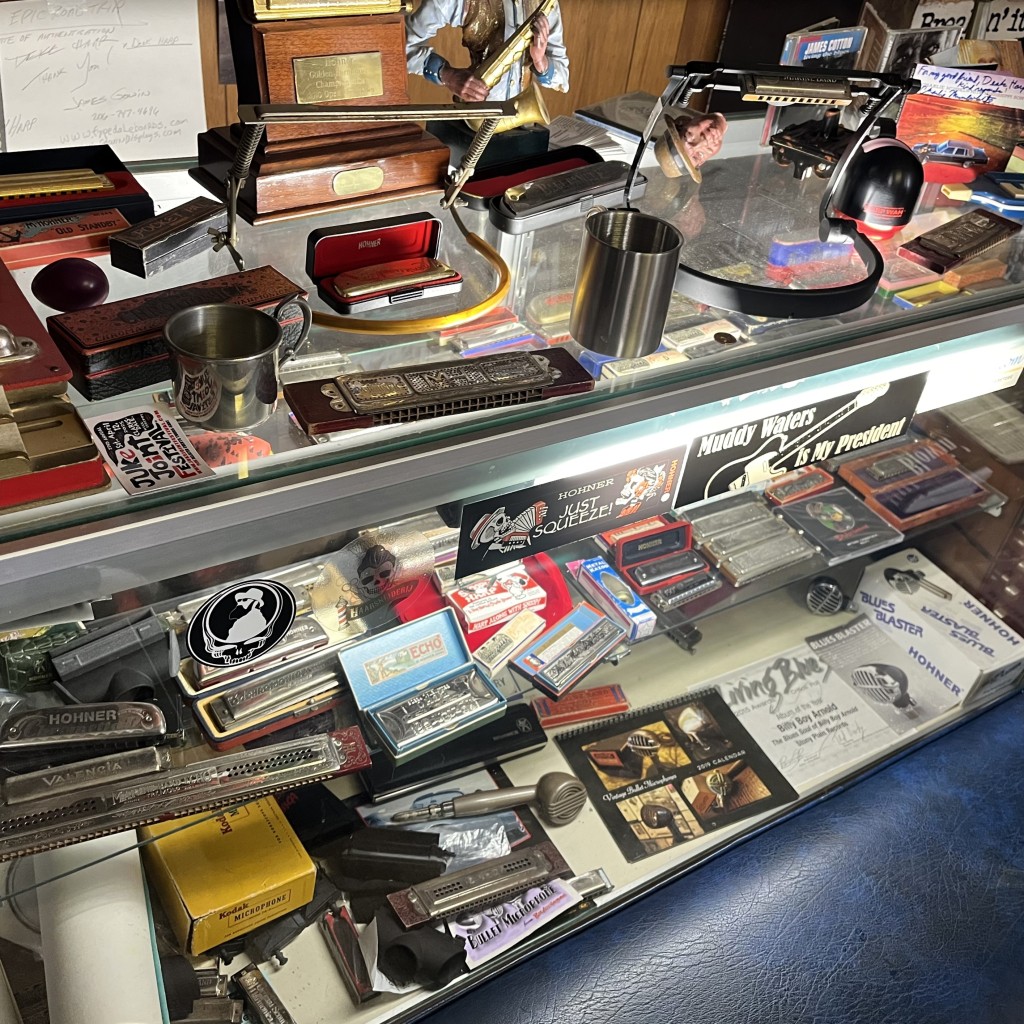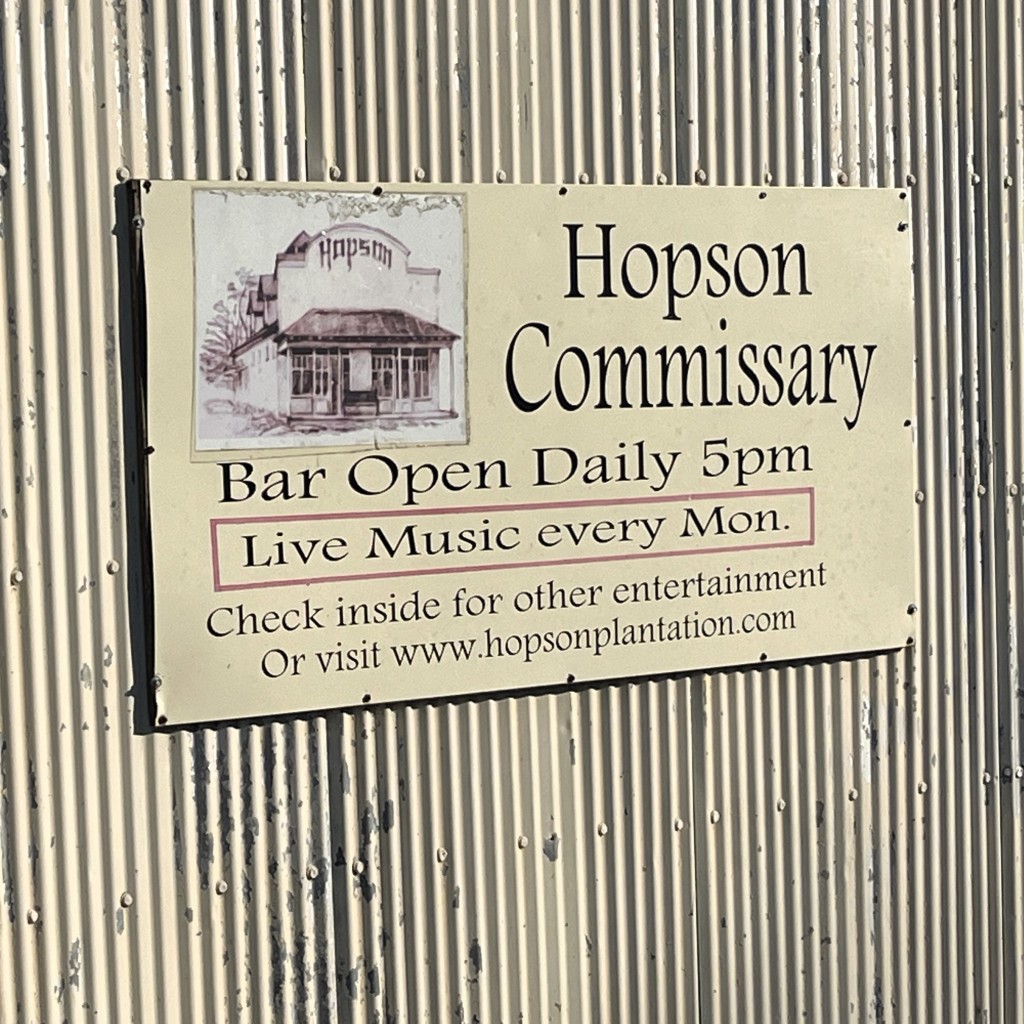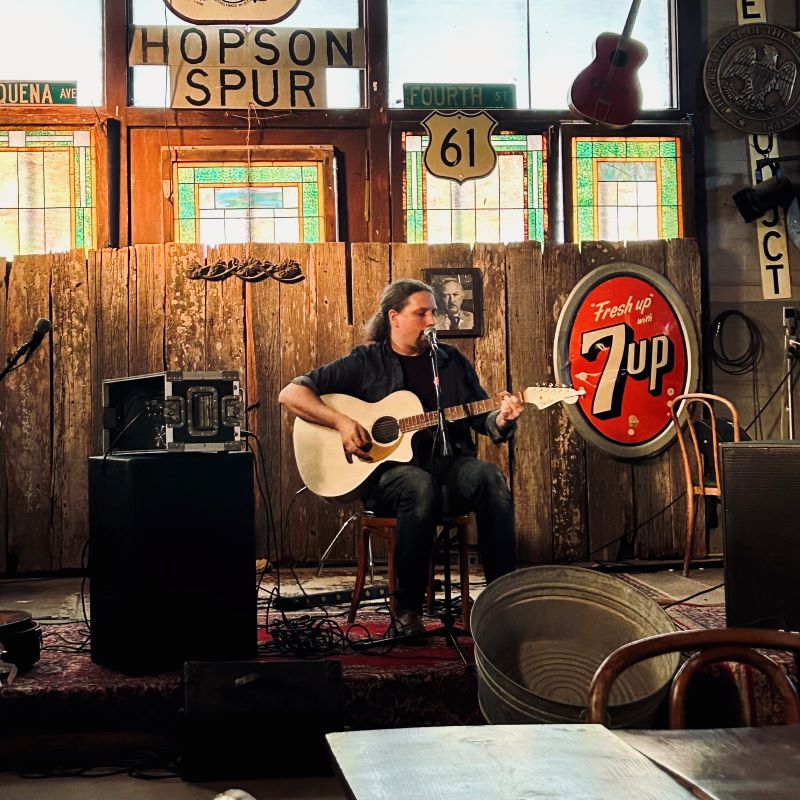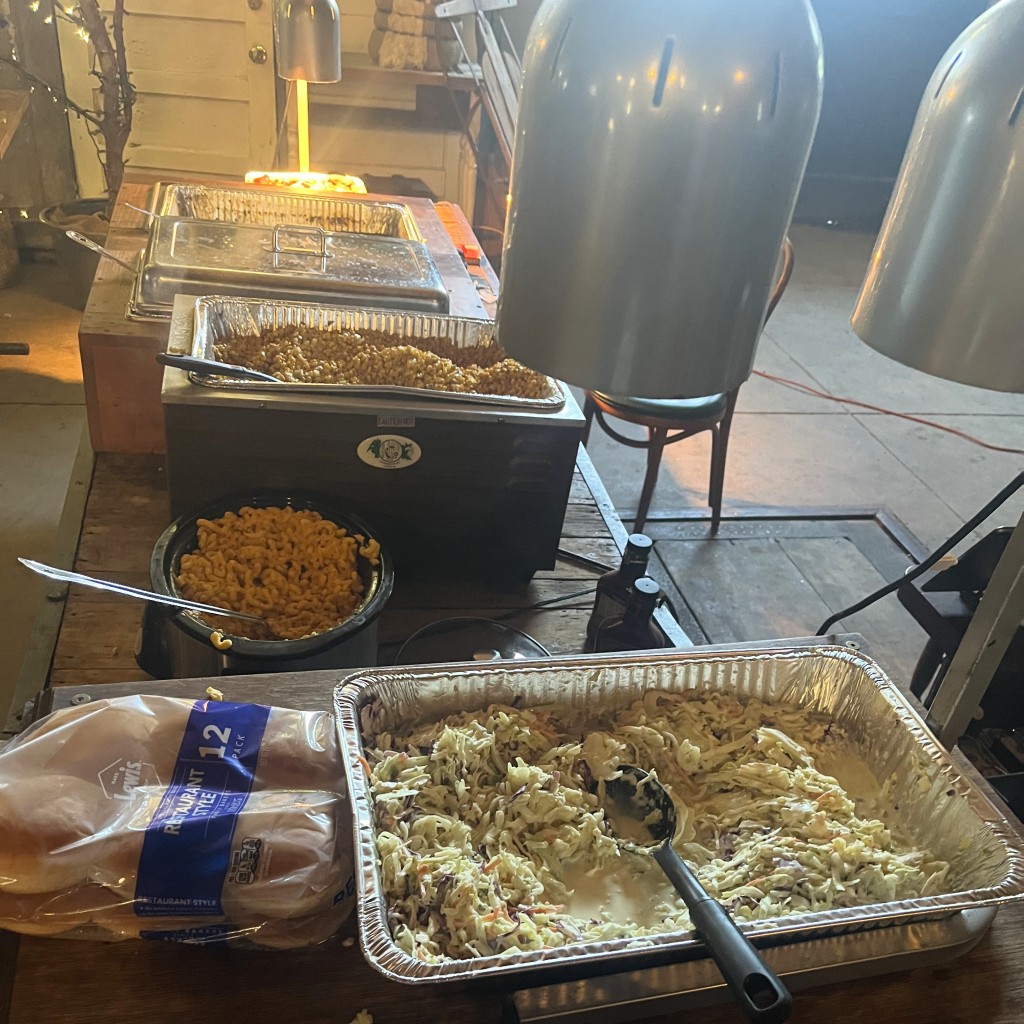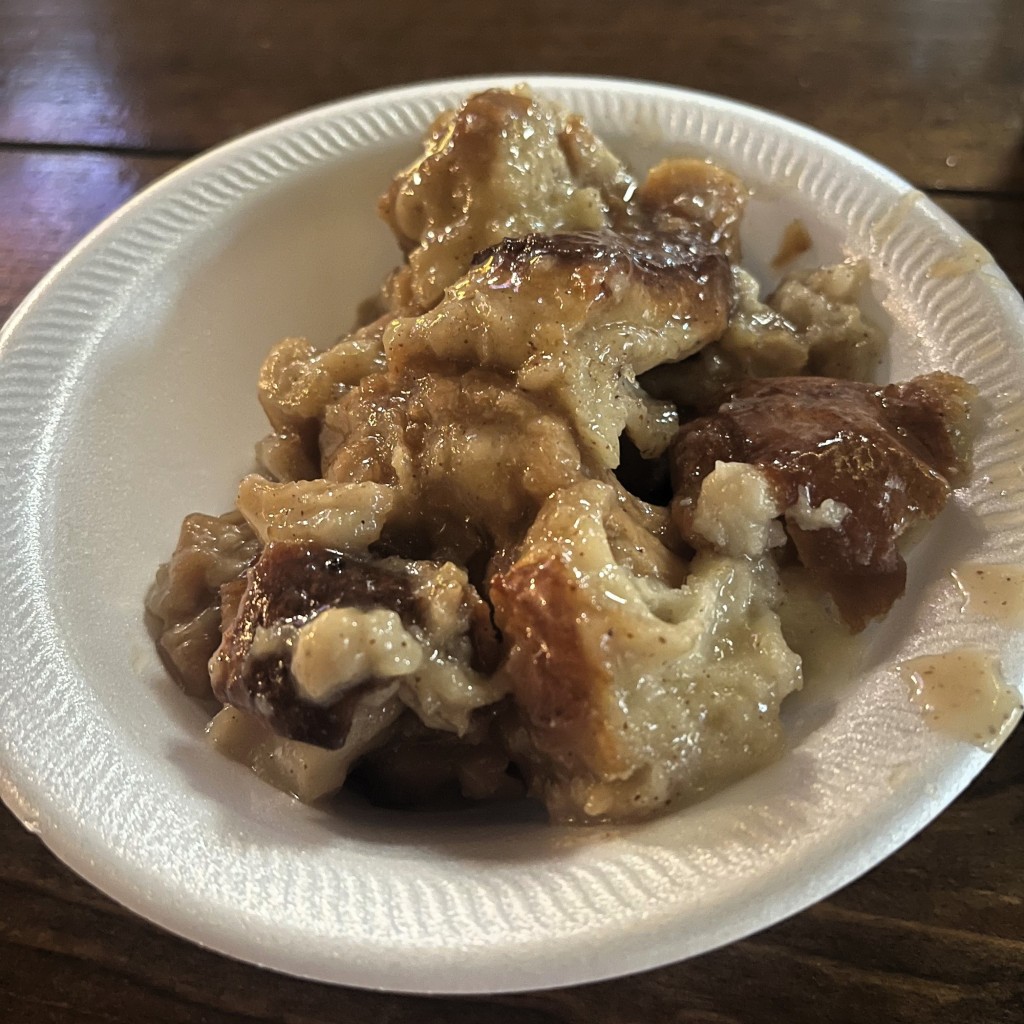Not everything is open on Sundays and/or Mondays in Clarksdale. The juke joints are silent and many shops are closed, even some that claim to have hours. But what is open can be absolutely wonderful and deserves to be experienced. After doing a bit of research, Matt and I planned our activities and proceeded to thoroughly enjoy the rest of our stay in town.
After enjoying a nice breakfast at Grandma’s House of Pancakes on Third Street on Sunday morning, we took a short ride beyond the downtown area to the intersection of US Highways 61 and 49, the legendary crossroads where some believe a young delta blues musician named Robert Johnson sold his soul to the devil to become a famous blues guitar player. Whether or not this ever happened, seeing the famed crossroads was an item on my bucket list, an item that has now been crossed off.
Yes, I have been to the crossroads, though I chose not to go at midnight. I have enough problems already; I don’t need any new ones. It’s a pretty busy intersection nowadays and on one corner of that intersection, we noticed a renowned BBQ restaurant, but it was not open at the time, so we went back the following day for lunch. More on that later.
We spent a fair amount of time, both Sunday and Monday, in the downtown area walking around, exploring, and determining what was open on either day. Four things are prevalent in downtown Clarksdale. For openers, murals are everywhere, some of them quite good. You can’t walk very far without seeing a mural painted on the side of a building, or on the face in some cases. These are not acts of graffiti, but intentional works, many of them signed by their respective creators. Most, but not all, have musical themes. These murals are best appreciated while on foot. When you’re walking and you come across an interesting mural, it’s easy to stop and look at it; maybe even take a photo or two. When you’re driving, things go by too quickly, even at 25 miles per hour. And besides, your eyes should be on the road, watching for pedestrians, and so forth.
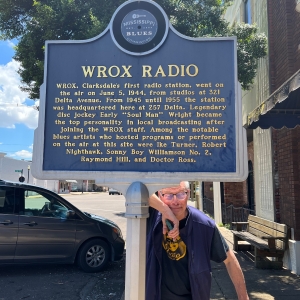
Also prevalent are the local historical markers — freestanding signs and bronze plaques — which share a great deal of information about significant businesses, people, and time periods that affected Clarksdale. Did you know that among other things, the rock and roll/R&B pioneer Ike Turner worked as a disc jockey at WROX Radio? That station is still in operation today, although not in its original location, and we listened to it while driving back and forth between our shack and other parts of Clarksdale. One can get a good sense of what has transpired in this city by reading these markers.
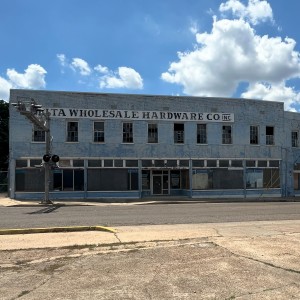
An unfortunate reality in downtown Clarksdale, as can be found in many other communities large and small, is urban decay. Right alongside the active commercial, retail, and residential structures in town are vacant ones, some of which have been abandoned for years already. We walked past a few former storefronts that were not just empty but falling apart.
It’s not all doom and gloom, though. The Ground Zero Blues Club occupies a building that had been empty for decades. On the next block, a former freight depot now houses an excellent museum, which I will get to shortly. Numerous unique and wonderful shops, restaurants, and music venues — some new and some that have been around for quite a while — are still very much in operation. Clarksdale also hosts a variety of festivals throughout the year. All of these things are drawing people from around the world to visit. I’m just one of those people. In my mind’s eye, these are the things that could very well reverse the decline of this city and make Clarksdale become for blues what Branson, MO became for country music.
Speaking of music, that’s the fourth prevalent thing. Communities with a substantial musical heritage are different from other communities in that their musical significance permeates everything. You’ll find it woven into the decor of restaurants and hotels. Their respective event calendars will be peppered with music and music-related happenings. And music won’t just be something to find downtown; for all intents and purposes, it is the downtown. Clarksdale is like that.
We discovered an amazing shop called Cat Head, self-described as “Mississippi’s Blues Store” by its founder, a gentleman named Roger Stolle. Roger is an amazing individual who moved to the already declining city of Clarksdale for the express purpose of promoting the delta blues tradition from within. I hadn’t known that when I visited the store, but it’s really an amazing story. One must visit Cat Head in person to experience what it’s all about. They sell a variety of merchandise, all related to the blues. They host live music performances and have supported or personally executed numerous projects aimed at promoting Clarksdale and its rich history.
Matt and I did not have the pleasure of meeting Roger Stolle while we were there, but we did get to meet another awesome individual. A gentleman named Frank, who had been minding the shop that day, engaged us in conversation as we were perusing the merchandise. When he found out we were staying at the Shack Up Inn, he asked which shack we were in and when Frank learned that we were staying in the Mule, he remarked, “You’re the guys who got moved from the Sweet Honey.” Naturally, I inquired as to how he knew that. Turns out Frank is one of the owners of the Shack Up Inn! Frank is also yet another individual who moved to Clarksdale because he gets what the Shack Up Inn is about and believes in the potential of Clarksdale. Frank is also a friend and fan of Roger Stolle, which is why he was helping out at Cat Head that day.
I had an aunt who would say about certain towns, “They roll up the sidewalks on Sunday evenings,” meaning that just about everything would be closed. I recalled her words as Matt and I began researching our Sunday supper possibilities. Most of the downtown places are not open on Sunday evenings, so we opted to go beyond that area to try Hibachi Buffet, out on State Street, which is well-rated online and open seven days a week. And man, did we strike pay dirt! The sheer variety of cuisine, from Asian specialties to Cajun and soul food dishes, all of them delicious, made me an immediate fan. Even before the pandemic, good buffet restaurants had become few and far between. It’s nice to know that there are still some good ones out there.
The juke joints are also quiet on Sundays, but Clarksdale boasts having live blues seven days a week and they deliver on that promise, too. One need only go as far as Cat Head’s “Sounds Around Town” page to see who’s playing where and when. Now I have to be honest, I wasn’t too sure about going to a hostel to hear blues music, but I was joyfully mistaken. The Auberge Clarksdale Hostel is a very inviting establishment and their Old Madidi Bar, formerly the Madidi Restaurant that was owned by Morgan Freeman and Bill Luckett until 2012, features live blues music in a somewhat intimate setting that Matt and I enjoyed very much.
Our entertainment for the night was provided by Terry “Harmonica” Bean, a delta blues artist — in fact, a very capable one-man blues band — and a most pleasant and personable entertainer. Matt and I found a low table with two comfy chairs by a window, located directly across from where Terry was seated and playing exactly the kind of music we had expected to hear down in the Delta. He played guitar, harmonica, and an amplified stomping board as he sang some of the best blues we would hear on our road trip. And when I say played, I mean worked. That man came on at 7:00 PM and didn’t call it quits until after 10:30 PM, taking only one incredibly short break during that whole time. We absolutely loved it!
On Monday, we returned to the famed crossroads right around 11:00 AM to see what Abe’s Bar-B-Q had to offer. Abraham Davis, a Lebanese immigrant, went into the restaurant business in the 1920’s and eventually moved it to the present location. His son, Pat Davis, Sr, took over the cafe in 1960 and the name was changed from Bungalow-Inn to Abe’s to honor the founder. Mr. Davis’ BBQ has been a regional sensation for 100 years now and judging by the line that had formed by noon, Abe’s remains a favorite with locals and travelers alike. Matt had a plate of hot tamales, which interestingly enough is a delta dish, and I had the Big Abe, a double-decker BBQ pork sandwich topped with coleslaw. Both were quite good and we were very glad that we had the idea to come in ahead of the lunchtime crowd.
Okay, this is a good one. On Third Avenue downtown, next to a former movie theater, is Deak’s Mississippi Saxophones & Blues Emporium, a must-see shop for any blues pilgrim while in Clarksdale. As is the case with Cat Head, you will not find another place on earth quite like Deak’s shop. Part store, part museum, part service center, and just a nice place to stop and visit. Deak Harp, an accomplished musician who used to tour with James Cotton, can take an ordinary off-the-rack harmonica, disassemble it, modify and customize the innards, and build a professional instrument. He did exactly that for Matt, who plays the harmonica on occasion, while we went off to do some more touristy stuff.
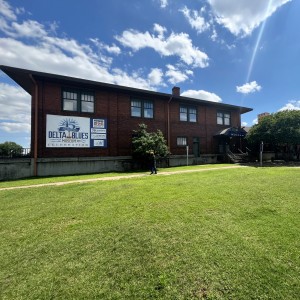
Where does one go on a Monday afternoon in Clarksdale to kill ninety minutes or so? I heartily recommend the Delta Blues Museum, which is housed in a former railroad depot just east of the Ground Zero Blues Club. A lot of thought, planning, and work have gone into this place and it shows. Their mission statement says it best: “The Delta Blues Museum is dedicated to creating a welcoming place where visitors find meaning, value, and perspective by exploring the history and heritage of the unique American musical art form of the blues.”

Unfortunately, photography is not allowed inside the museum, so the only photos I have are from the exterior. But within those walls is a vast treasure of exhibits, artifacts, and many, many stories of the blues from its beginnings down in the Mississippi Delta to the global phenomenon that it has become. Although I consider myself a blues aficionado, I really know only a fraction of the whole story. Places like this are where people like me can go to gain additional knowledge and a better perspective on the genre. In truth, we could have stayed longer. There is a lot to see in there! Very cool.
It was just over 90° in the shade when we returned to the shop to complete Matt’s purchase and believe me, we were feeling it. I sent Matt ahead to Deak’s and walked over to my car to fetch some bottled water. When I walked into the shop, I found three gentlemen inside talking. Matt was in an old upholstered chair by the door, Deak was seated at his work desk, and seated in another upholstered chair near Deak sat none other than Charlie Musselwhite, one of the greatest blues harmonica players of our time. A pivotal figure in helping revive the Chicago blues scene in the 1960s, Charles Douglas Musselwhite is a Grammy Award-winning artist who has also won 33 Blues Music Awards and has been inducted into the Blues Hall of Fame. And there he sat, smiling away and passing time with Deak Harp and my friend Matt.

When the opportunity presented itself, just to be sure, I asked, “Excuse me… Is that Charlie?” Everybody nodded, including Charlie. I tried not to gush too much as I stepped over to shake hands and introduce myself. The conversation continued about harmonica playing, life as a blues artist, and so on. Before we left, Matt and I took turns photographing each other with the two blues men, who then continued their visit after we bade them goodbye. I’m sure Matt and I were grinning ear to ear as we walked back to the car.

As we headed back to the Shack Up Inn, I made a point of stopping to snap a photo of a peculiar sight that we saw every day while in Clarksdale. On US Highway 49, between the inn and the city proper, is a railroad crossing at which a long line of freight cars has been uncoupled to allow highway traffic to pass through. What makes it odd is that the line of freight cars extends in both directions as far as the eye can see. And that line never moved or changed during the entire time we were there. The cars aren’t old or rusted. It just appears as if someone long-term parked a very long freight train down here.
We spent our last evening in Clarksdale at the Hopson Commissary, which is located on the same plantation as the Shack Up Inn. This 100-year- old building used to be the commissary for Hopson Farm in the early 1900’s. Now it serves as an event venue and on Monday nights, they feature live music and a homestyle buffet dinner.
The food was wonderful, my beer was cold, and the staff was warm and friendly. On stage, Marshall Drew, a local folk rock singer-songwriter with a pleasant voice and playing style, entertained everybody. This was an easy way for us to finish off our stay in Clarksdale, as we then had an incredibly short drive back to our shack, where we could kick back, relax, and ponder all that we had seen and done during our stay.
We still had one more city to visit on this road trip, but I’ll save that for next time. Thank you so much for hanging with me!
Discover more from This Is MGD Time
Subscribe to get the latest posts to your email.
